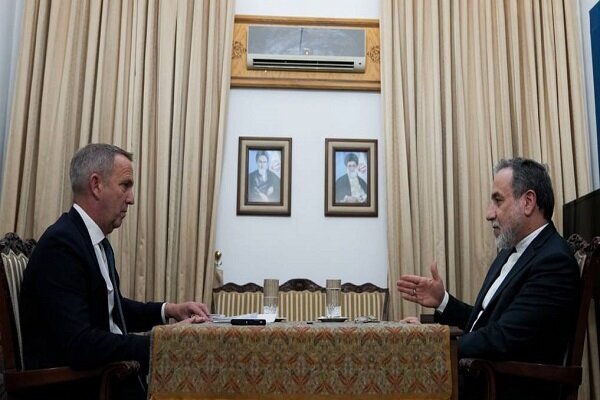Path to diplomacy narrow, but still open with serious commitments: Iran FM

TEHRAN – Iranian Foreign Minister Abbas Araghchi has said that while the path to diplomacy remains open, any resumption of nuclear negotiations hinges on serious commitments from the United States, including compensation for the recent joint U.S.-Israeli aggression and firm guarantees against future attacks during talks.
In an interview with the Financial Times published on Thursday, Araghchi stated that the Islamic Republic cannot return to the negotiating table under the current circumstances, describing last month’s attacks as a deliberate and coordinated effort to undermine diplomatic progress.
“We cannot accept a return to business as usual,” Araghchi stressed. “They must explain why they attacked us in the middle of negotiations and give assurances that such aggression will not happen again. Moreover, they must compensate for the damage they have inflicted.”
The foreign minister was referring to the 12-day conflict that began on June 13, when the Israeli regime launched a surprise and unprovoked war against Iran, targeting high-ranking commanders, nuclear scientists, and civilians.
More than a week into the aggression, the United States joined the hostilities by bombing three Iranian nuclear facilities—a move Tehran has denounced as a gross violation of international law, the United Nations Charter, and the Nuclear Non-Proliferation Treaty (NPT).
In retaliation, Iranian Armed Forces carried out precision strikes on strategic targets across the occupied Palestinian territories and the American-run al-Udeid Air Base in Qatar, which serves as the largest U.S. military installation in West Asia.
These decisive operations, carried out on June 24, forced Tel Aviv to request a ceasefire, effectively halting the illegal offensive and underscoring Iran’s deterrent capabilities.
‘Negotiations possible only with guarantees and reparations’
While reaffirming Iran’s openness to diplomacy, Araghchi made clear that any future talks must be accompanied by tangible confidence-building measures, including guarantees of non-aggression and financial compensation.
“The road to negotiations is narrow, but not closed,” Araghchi said. “I must convince my superiors that the other side is approaching the talks with genuine political will for a win-win outcome.”
He noted that U.S. envoy Steve Witkoff had continued to exchange messages with him during and after the war, proposing the resumption of talks. However, Araghchi underlined that Iran cannot move forward without clear commitments from Washington.
“We need to see real changes on their side. The war has only intensified our distrust—especially toward President Trump, who already tore up the JCPOA once before.”
According to Araghchi, the Iranian public remains deeply skeptical of any renewed negotiations with Washington, given the record of betrayal and military hostility.
“People are telling me not to waste time and not to be deceived again,” he said. “There is a strong belief that if the U.S. comes back to the negotiating table, it will be merely a smokescreen for other hostile actions.”
Iran and the United States had held five rounds of indirect talks focused on reviving the JCPOA before the onset of Israeli aggression. A sixth round was scheduled to take place in Muscat, Oman, on June 15, but had to be cancelled following the military escalation.
On June 22, Washington officially entered the war by targeting Iranian nuclear sites—further undermining the prospects for peaceful dialogue.
Iran rejects US demand for ‘zero enrichment’
The Iranian foreign minister also reiterated that Tehran will never accept Washington’s demand for zero uranium enrichment, calling it a non-starter.
“There is no possibility of a deal under those conditions,” Araghchi asserted. “We are ready to engage in negotiations where both sides present their arguments, but if they insist on zero enrichment, there is nothing to discuss.”
Tehran warns Europe over ‘snapback’ threats
Araghchi also criticized the European parties to the JCPOA—namely Britain, France, and Germany—for their recent warnings that they may activate the so-called snapback mechanism, which would reimpose UN sanctions on Iran if it fails to resume cooperation with the International Atomic Energy Agency (IAEA) and talks with the United States.
He said the E3 had already failed to honor their obligations under the nuclear deal and warned that if they proceed with the snapback move, Tehran would sever all negotiations with them.
“There is no reason to negotiate with the Europeans right now,” Araghchi said. “They are incapable of lifting sanctions or delivering results. If they activate snapback, that will be the end of the road for them.”
Leave a Comment